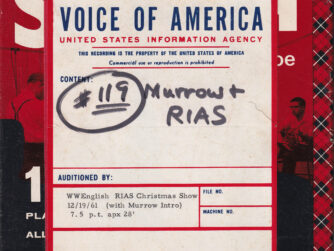Digitally restored 30-minute archival recording by VOA Central Recording for the National Security Agency (NSA)
Introduction
In April 1986, amid Cold War tension and the slow but steady rebirth of democracy in Poland, the Voice of America (VOA) Polish Service continued its expanded shortwave schedule—five hours daily—broadcasting from Washington, D.C. to a country still under some martial law restrictions.
The segment presented here, recorded on April 23, 1986, by VOA’s Central Recording department for the National Security Agency (NSA), preserves a 30-minute excerpt of the Polish Service’s regular programming. The reel was most likely produced for U.S. government language-training purposes rather than for intelligence review.
Inside the Polish Service Studio
Audio restored from ¼-inch analog reel. No compression or filtering applied beyond correction for tape wear.
This half-hour captures the essence of VOA journalism at the time: factual, balanced, and professional. The voices of Renata Lipińska, Zdzisław Mikulski, Bogdan Wojciechowski, Janusz Hewell (he was formerly a DJ on Radio Free Europe’s popular “Rendezvous at 6:10” music program), and other program hosts and reporters reflect the confident sound of VOA’s Polish Service during the Reagan years. Their calm tone and crisp diction, combined with new program content, demonstrate why the Polish Service enjoyed an unusually high reputation among Polish listeners behind the Iron Curtain.
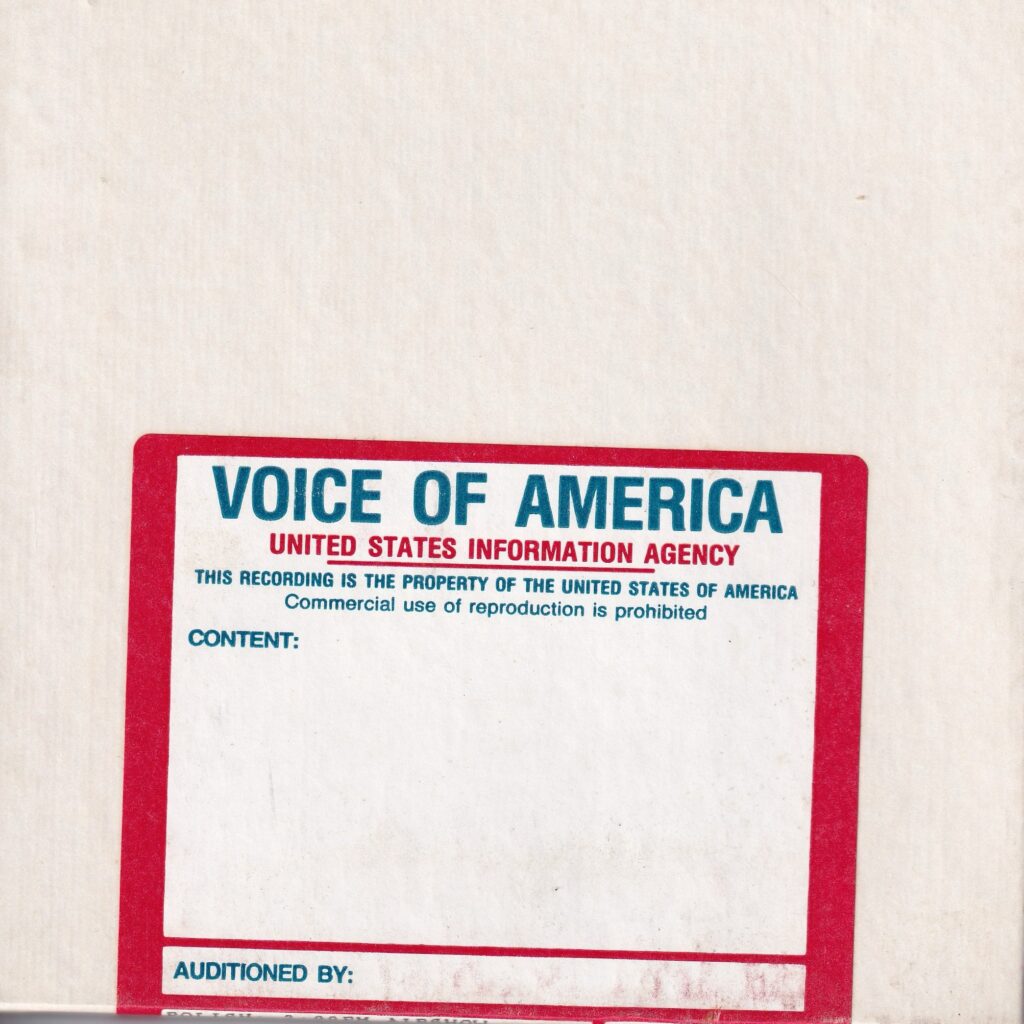

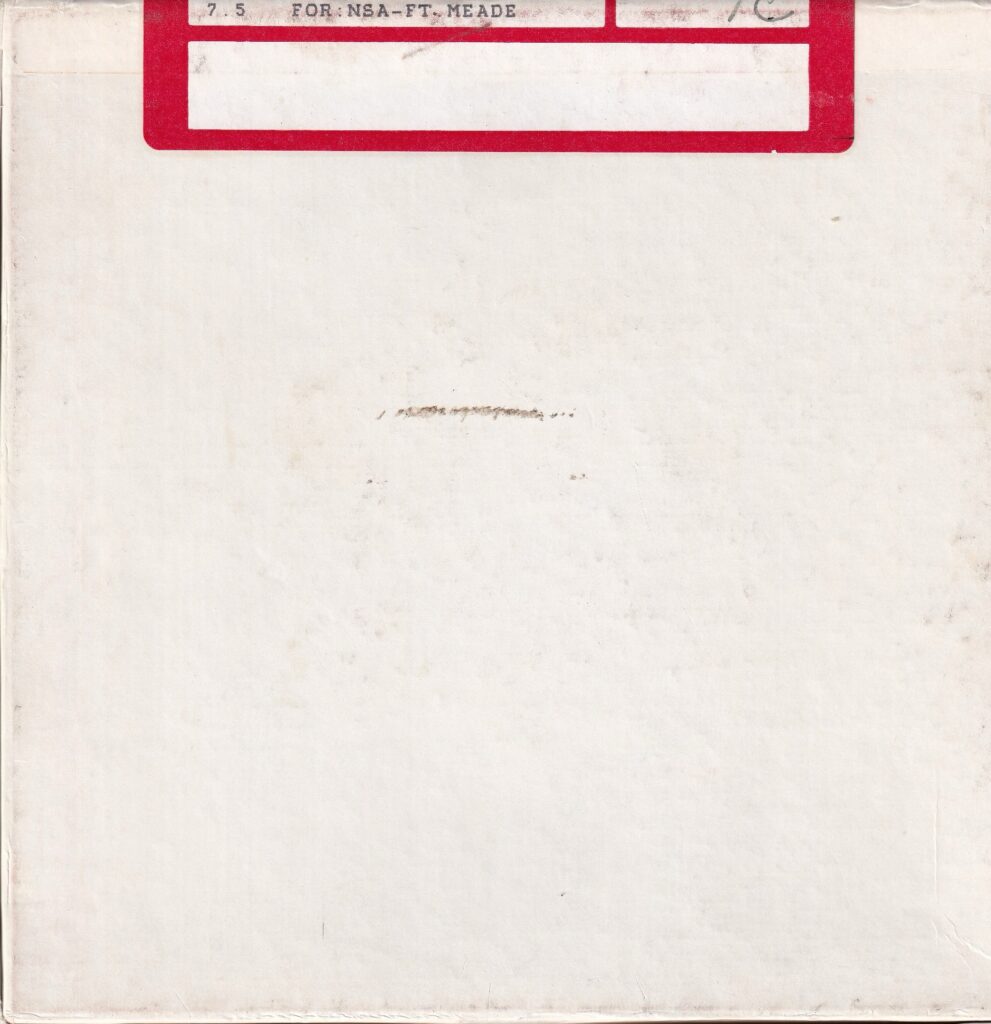
Courtesy of the Cold War Radio Museum collection. Digital restoration completed in 2025.
Summary
This newly digitized 30-minute recording, dated April 23, 1986, captures another segment of the Voice of America Polish Service broadcast from Washington, D.C., recorded by VOA’s Central Recording department for the National Security Agency (NSA)—most likely for linguistic training and analysis. As with the previous recordings from April 21 and July 21, 1986, the Polish Service newsroom operated within the wider editorial transformation of VOA during the Reagan Administration, when reforms in management, staffing, and funding reshaped the organization’s journalistic reach and tone.
Under President Ronald Reagan, VOA’s Polish Service—then directed by Tadeusz A. Lipień (Ted Lipien)—was granted greater editorial freedom and additional airtime, expanding from roughly two and a half hours to over five hours daily (initially seven hours) after martial law was imposed in Poland in 1981. The Service was now permitted to broadcast frank criticism of communist regimes, interviews with underground opposition leaders, and a wider range of independent news and cultural programming.
Journalistic Tone and Impact
Despite VOA’s Cold War mission, the broadcasts were informative, non-partisan, and professionally voiced—exemplified here by Renata Lipińska (radio name of Margaret White) and Janusz Hewell, both noted for their exceptional radio delivery.
The April 23, 1986, segment features international news and a VOA editorial, reflecting the Service’s balance between world affairs and U.S. domestic reporting. Although no original reports from VOA correspondents appear in this half hour, the Polish Service at the time regularly included exclusive material from Wacław Bniński in Rome, Bogdan Marison in Paris, and freelance contributors such as Jan Grużewski and Jan Zalewski (radio name of Juliusz Ślaski) in Munich.
Additional cultural and educational content—language lessons, music features, and “Americana” segments—filled other parts of the five-hour schedule. The Service’s weekly internal memorandum for April 15–21 1986, titled “Polish Service Highlights”, lists numerous reports, including Marek Święcicki’s coverage of the Katyn Massacre anniversary, Marek Krzyżański’s interviews about the JFK Freedom Award for Lech Wałęsa with Phil Burgess, Ted Sorensen, and Jerzy Milewski, and U.S. press analyses of the Polish economic crisis. These examples illustrate the depth and range of VOA’s Polish broadcasts during this period. 1
The period also saw record-high audience levels in Poland, where surveys by independent research groups confirmed that VOA and RFE/RL together reached tens of millions of listeners weekly—despite jamming.
Historical Context: VOA under Reagan
Toward the end of the Cold War, the Republican administration of President Ronald Reagan greatly increased spending on international broadcasting to the Soviet bloc. The Reagan administration expanded the budgets of VOA, Radio Free Europe (RFE), and Radio Liberty (RL), while restoring the name of the United States Information Agency (USIA). These reforms aimed to modernize the transmission system, strengthen journalism, and counter Soviet disinformation.
The Polish Service — once limited and cautious due to programming restrictions from VOA’s American management and limited funding — was given resources and new freedom to report frankly on communist governments and human-rights abuses. By the mid-1980s, it broadcast several hours daily, originating its own reports from Europe and the United States. Following the imposition of martial law on December 13, 1981, the VOA Polish Service expanded from 2½ hours to 7 hours daily, later stabilizing at 5. Audience reach grew dramatically.
Correspondents such as Wacław Bniński in Rome and Bogdan Marison in Paris supplied regular coverage of papal visits, European politics, and Solidarity activities. “Polish Service Highlights, April 15–21, 1986,” reports original features from Paris and Rome, a Katyn Massacre anniversary segment by Marek Święcicki, and interviews conducted by Marek Krzyżański with Phil Burgess, Ted Sorensen, and Jerzy Milewski. While the April 23 recording focuses more on international news, similar reports from these correspondents likely aired elsewhere on that day and throughout the week.
Reagan-appointed VOA Director Kenneth Y. Tomlinson recalled that arranging coverage of Pope John Paul II’s visit to Poland was his proudest achievement at VOA. Interview with Kenneth Y. Tomlinson (VOA, 2012). Tomlinson served as VOA Director from 1982 to 1984 and later as Chairman of the Broadcasting Board of Governors. Such coverage inspired audiences and signaled VOA’s independence from diplomatic caution and restrictions on program originations previously imposed by VOA’s American managers and central English newsroom editors. While the Reagan administration provided expanded resources, the Polish Service maintained professional independence and avoided partisan bias in reporting on U.S. domestic affairs.
According to underground and Western surveys, VOA’s Polish Service reached nearly 50 percent of adult listeners in Poland—almost matching RFE. APOR and EEAOP listening-rate studies (1986): RFE 63–65 %, VOA 48–50 %, BBC 30 %, DW 10 %.2
Each VOA Polish Service broadcast day combined hard news with cultural programming—music, literature, and English-language instruction—creating a rounded portrayal of America and the world. Because only short news segments were preserved for the NSA, this 30-minute reel primarily focuses on international events and the official VOA editorial. VOA’s Central Recording routinely duplicated selected broadcasts for the NSA’s Foreign Language Program. The recordings served as pronunciation and translation materials, not as propaganda tools.
Program Highlights: April 23, 1986 Broadcast
April 23, 1986 segment — extensive summary (English)
Program frame. The half-hour opens with a straight newscast and closes with a brief headline recap. Between those, you hear one centrally prepared Voice of America Editorial (clearly identified on air as reflecting the views of the U.S. Government) plus three reported segments: (1) a commentary on the Western European communist parties’ decline, (2) a market/energy report from New York on OPEC’s production decision and price reaction, and (3) a British press roundup tied to EEC measures against Libya after the U.S. strike.
Lead news (Poland & terrorism). Underground Solidarity’s leadership calls on Poles to hold independent May Day observances; spokesman Jerzy Urban is quoted as warning against “provocations.” Europe-Middle East terrorism remains prominent: expulsions/limits for Libyan diplomats, continuing security moves, and follow-ups to the West Berlin disco bombing.
International desk. Briefs include: Corsican separatist bombing near Bastia; the Afghan war (U.S. bombing of Zhawar cave complex reported by international agencies); a U.N. commission list of Nazi war criminals; an item on arrests tied to illegal U.S. arms/technology exports; and a stateside story on Hialeah, Florida, where a city vote to donate confiscated weapons to Nicaraguan contras collides with federal law.
Culture/obituary. The death of film director Otto Preminger (79) is noted.
VOA Editorial (clearly labeled). The editorial—translated from English—focuses on people-to-people and scientific exchanges, using the treatment of Andrei Sakharov and Yelena Bonner as a litmus test for genuine Soviet openness. It cites the U.S. National Academy of Sciences’ appeal to the Soviet Academy on Sakharov/Bonner, condemns punitive measures against independent scientists, and argues that free scholarly exchange is essential if East-West contacts are to be meaningful.
For listeners in communist Poland, the editorial’s defense of Andrei Sakharov and Yelena Bonner carried special resonance, reflecting VOA’s growing moral authority as an advocate for human rights and intellectual freedom.
European left analysis. A substantial commentary surveys crisis and fragmentation in Western communist parties (France, in particular), referencing press reactions and the rise of socialists/greens while the PCF fails to break with Moscow. Italian and French press views (e.g., Corriere della Sera) are summarized. Segments like this demonstrated VOA’s effort to interpret global political changes in language accessible and relevant to Polish listeners—illustrating the fading appeal of communism not just in the East, but also across Western Europe.
OPEC & markets. From New York, Debbie Gallant reports (voiced in Polish) that OPEC’s partial production cut is unlikely to reverse the oil-price slide (≈60% down since December). Traders view the decision as insufficient; cartel cohesion is in doubt; near-term prices may soften further before stabilizing.
British press roundup. Jan Zalewski relays The Times, Guardian, and Financial Times: the EEC (EWG) tightens measures against Libya (staff cuts, movement limits), Western coordination with the U.S. improves, and West Germany’s position is pivotal.
Promos & continuity. A short promo invites listeners to “Motorama USA” (Wojciech Minicz). The segment concludes with a concise headline recap, again emphasizing the Solidarity May Day appeal.
Full Transcript and Archival Record
This ¼-inch reel-to-reel tape was recorded by VOA’s Central Recording unit for NSA language training and preserved in excellent condition. The Cold War Radio Museum digitally restored it in 2025 for archival publication.
Voice of America Polish Service – April 23, 1986 (3:00 – 3:30 p.m. EDT)
0:03 – 0:12
This is the Voice of America from Washington. Good evening. Here is the news.
0:13 – 0:22
The underground leadership of Solidarity has appealed to the Polish people to take part in independent May Day observances. Libya has ordered hundreds of Western journalists to leave the country.
0:23 – 0:34
West Germany has decided to expel more than half of the Libyan Embassy staff in Bonn and to restrict the movement of those who remain, citing Libya’s role in international terrorism.
0:35 – 1:10
Here are the details. The underground leadership of Solidarity has called on Poles to join next week’s independent May Day demonstrations. The appeal—signed by Solidarity’s underground leaders—says that such observances will demonstrate patriotism and opposition to violence, as well as solidarity with Poland’s political prisoners. According to official figures, there are 159 political prisoners in Polish jails, but opposition sources put the number at over 200.
1:10 – 1:22
Government spokesman Jerzy Urban indicated yesterday that the authorities may consider declaring another amnesty for political prisoners. He again accused the West of supporting the Polish opposition.
1:24 – 1:42
Libyan authorities have ordered hundreds of foreign correspondents to leave the country, declaring that “the events they came to cover have ended.” News agencies report that correspondents from Arab and Eastern European countries, as well as Japanese and Canadian journalists, have been allowed to stay.
1:42 – 2:26
Initially, officials in Tripoli announced the immediate expulsion of all Western reporters in retaliation for the European Economic Community’s decision to reduce the number of Libyan representatives in EEC countries. Later, Libyan authorities stated that the correspondents were asked to leave because there was “insufficient accommodation” for the numerous media representatives who wished to visit. The Times of London reports that Colonel Muammar Qaddafi appears to have lost exclusive control of the country and that power in Libya is now exercised by a military junta. Government spokesmen, however, insist that Qaddafi remains fully in charge.
2:26 – 2:39
The Federal Republic of Germany has decided to expel 22 of 41 Libyans employed at the Libyan mission in Bonn and to restrict the movement of the remainder within West German territory.
2:40 – 3:18
The Bonn government took the step in response to Libya’s support for international terrorism. Foreign ministers of the European Economic Community, meeting last week in The Hague, agreed on firm measures against Libya. A West German spokesman also said that Bonn will recall three of its 19 embassy staff members from Tripoli. France’s Foreign Ministry announced that, in line with the EEC decision, it also intends to reduce the Libyan mission staff in Paris, although no concrete actions have yet been taken.
3:19 – 3:32
In Athens, Prime Minister Andreas Papandreou told Parliament he has no evidence that Libya supports international terrorism and that Greece, therefore, will not join the EEC in imposing sanctions against Tripoli.
3:34 – 3:59
President Reagan has again appealed for international cooperation in combating terrorism. Speaking in Washington, he urged Arab nations in particular to join what he called the struggle against “this plague of civilization.” The President said Arab countries themselves have suffered from brutal terrorist attacks. He called it hypocritical for Muammar Qaddafi to hope for support from the Islamic world after the American air strike on Libya.
4:00 – 4:38
President Reagan stressed that the United States harbors no hostility toward the Libyan people, but he vowed that Washington would act again if the Libyan regime continues its campaign of terror against Americans. The President said last week’s raid proved that “no one can boast of killing Americans with impunity.” He added that unilateral action against terrorism is not enough—collective action is required—and noted that terrorism would certainly be a major topic at the upcoming Tokyo economic summit of the seven leading industrial democracies.
4:39 – 5:03
Corsican separatists have set off explosives at a resort near the city of Bastia. Ten people were injured in the blast, which caused heavy damage, including the destruction of a transformer. The Corsican National Liberation Front has been attacking tourist centers as part of its campaign for the island’s independence from France.
5:04 – 6:00
According to insurgent sources in eastern Afghanistan, the main underground headquarters of the resistance in Paktia Province has been destroyed after an 18-day offensive by Soviet and Afghan government forces. The base, located in the mountain caves of Zhawar, served as the principal supply center for guerrillas operating deeper inside Afghanistan. The artillery and air attack, which began on April 4, was described by the mujahedin as the heaviest of the war in Paktia. The base commander, wounded during the bombing, denied Soviet and Kabul claims that the stronghold had been captured, saying his forces still control the site and that government troops have withdrawn—though he admitted that the complex was largely destroyed and that heavy losses of weapons were sustained.
6:01 – 6:49
The Washington Post reports that the United Nations War Crimes Commission recommended after World War II that Kurt Waldheim be prosecuted for war crimes. According to the paper, in 1948, the Commission found sufficient evidence to bring charges against Waldheim, who later became the U.N. Secretary-General in 1972. The recommendation was based on a 1947 report from the Yugoslav government listing Waldheim among wanted Nazi war criminals.
6:50 – 7:26
Israeli authorities have flatly denied any connection with an attempt to smuggle U.S. weapons worth more than two billion dollars to Iran. The U.S. Commerce Department has charged 17 people with trying to supply Iran with military equipment in violation of American law. Three of the suspects—Israelis arrested in Bermuda—will be extradited to Israel. One, Reserve General Avraham Bar-Am, told Israel Radio that the Defense Ministry was aware of the affair. Additional arrests were made in New York.
7:27 – 7:55
Arrest warrants have also been issued for eight other suspects still at large. Alongside Israelis, the case involves citizens of the United States, Greece, West Germany, France, and the United Kingdom. An Israeli Defense Ministry spokesman insisted that Israel had no direct, indirect, or tacit role in the scheme. The United States bans arms sales to both sides in the Iran-Iraq war.
7:56 – 8:39
The City Council of Hialeah, Florida, has voted unanimously to donate weapons confiscated by local police to Nicaraguan anti-Sandinista rebels. The mostly Latin-American community normally destroys between 600 and 1,000 firearms a year by dumping them into the sea. The head of the U.S.-based Committee for Freedom group said his organization hopes for similar gestures from other municipal and state authorities but acknowledged that congressional approval will be needed before any weapons can legally be shipped abroad.
8:41 – 9:02
Film director and producer Otto Preminger died in New York at the age of 79. Born in Austria, Preminger—who was Jewish—fled Hitler’s persecution in 1935. He directed such films as Porgy and Bess, Exodus, and Anatomy of a Murder. A spokesman said he had been suffering from cancer.
9:03 – 9:39
And now, a brief recap of the news. Solidarity’s underground leadership has called on Poles to take part in independent May Day celebrations. Libya has ordered hundreds of Western journalists to leave the country. West Germany will expel more than half of the Libyan Embassy staff in Bonn because of Libya’s role in terrorism. These were the headlines. The news was read by Renata Lipińska and Zdzisław Mikulski. This is the Voice of America from Washington.
9:43 – 10:49
In the next part of our evening program, we will present the Voice of America editorial, today devoted to the case of Andrei Sakharov and the appeal by American scientists on his behalf. Later, we will discuss the crisis of Communism in Western Europe, report on decisions taken at the OPEC meeting, and summarize British press opinions about the Common Market conference. You will also hear our economic bulletin on the impact of falling oil prices. Still ahead is our report on the Soviet automobile industry, followed by our feature series, Americana. This is Washington — you’re listening to the Voice of America.
Voice of America Editorial — Andrei Sakharov
(Reflecting the views of the Government of the United States)
We now present a Voice of America Editorial, reflecting the views of the Government of the United States.
One of the positive results of last November’s meeting between President Reagan and Mikhail Gorbachev was their agreement to resume cultural, educational, and scientific exchanges between the two countries.
Once again, Soviet artists are visiting the United States, while American performers are appearing in the Soviet Union. Exhibitions of paintings are also being exchanged between the two nations.
Earlier this year, the U.S. National Academy of Sciences signed a two-year agreement on scientific exchange with the Soviet Academy of Sciences. Six years ago, the American Academy suspended all scientific cooperation with the Soviet Union to protest Moscow’s persecution of Nobel Prize laureate Andrei Sakharov.
Last week, although the Academy wishes to renew contact with Soviet scientists, it once again sent an appeal to the Soviet Academy of Sciences in defense of Sakharov.
In a telegram signed by the Academy’s president, Frank Press, it was suggested that joint steps to ease Sakharov’s plight would help create a better atmosphere for future exchanges. Moreover, the telegram stated that the U.S. National Academy of Sciences would continue to express concern for Sakharov’s fate until all his rights are restored.
The persecution of Andrei Sakharov is one of the most shameful chapters in the modern history of man’s inhumanity to man. Andrei Sakharov, a distinguished physicist who became one of his nation’s leading defenders of human rights, was sentenced to exile and stripped of previously awarded state honors. He also became the target of a vicious campaign in the Soviet press.
Recently, a letter written by Sakharov to his former colleague, Anatoly Alexandrov, the president of the Soviet Academy of Sciences, was sent to the West. In it, Sakharov writes of a period in his life that can only be described as hell on earth.
In the summer of 1984, he began a hunger strike to protest the Soviet authorities’ refusal to allow his wife, Yelena Bonner, to travel abroad for medical treatment. She was being interrogated by the KGB. While accompanying her to one of these interrogations, Sakharov was seized by a group of KGB thugs, taken by force to a hospital, and subjected for four months to forced feeding.
The eminent scientist was thrown onto a hospital bed, his arms and legs tied, and a metal clip fastened to his nose so that, in order to breathe, he had to open his mouth. Each time he did so, the attendants standing by his bed immediately forced food down his throat, compelling him to swallow.
These tortures finally drove Sakharov to abandon his hunger strike. They also caused symptoms of a stroke and led to Parkinson’s disease.
In December 1985—more than a year and a half later—the Soviet authorities finally permitted Yelena Bonner to go abroad. She underwent complex heart surgery and remains in convalescence. Her husband continues to be held in exile in the city of Gorky, thousands of kilometers away from the woman he loves.
Appeals to the Soviet government for his release have so far brought no result. Mikhail Gorbachev has said that Sakharov cannot be allowed to leave the country because he “knows too many military secrets.” In reality, Sakharovhas had nothing to do with any classified work for eighteen years.
There can be no doubt that both the United States and the Soviet Union would benefit from renewed scientific exchange. Yet American scientists will find it difficult to take part wholeheartedly in such exchanges as long as the inhuman treatment of Andrei Sakharov continues.
This was a Voice of America Editorial, reflecting the views of the Government of the United States. This is Washington.
The history of Western Communist parties in the industrialized democracies is a story of deepening crises, electoral defeats, and internecine fights to the death.
Edmund Demaitre of the Voice of America Newsroom discusses the meaning of these developments. His analysis is read by Bogdan Wojciechowski.
Commenting on the French Communists’ poor showing in the recent elections—in which they received less than 10 percent of the vote—the Paris daily Le Monde described France’s Communist Party as a castaway. Milan’s Corriere della Sera wrote that French voters had sent the Communist Party into retirement.
Luciano Lama, former leader of Italy’s Communist-dominated trade union federation and a member of the Central Committee of the Italian Communist Party, said in an interview that the French Communists’ defeat could push the party to the margins of political life. L’Unità, the Italian Communists’ official daily, struck a similar note. In an editorial criticizing the leadership of the French Communist Party, L’Unità stated that the lesson of the French elections is perfectly clear: Communist parties must either renew themselves from within or die. That view is shared by more than a hundred French intellectuals and by regional and local leaders of the French Communist Party.
Most recently, they paid for and placed a advertisement in Le Monde, calling for an extraordinary party congress to debate what some of the signers referred to as the collapse of the French Communist Party. The petition was rejected by the Central Committee, which is dominated by hardliners often described as neo-Stalinists who support party leader Georges Marchais. Despite the Central Committee’s decision, the debate is far from over. The Reformers’ faction—as they call themselves—continues, under Central Committee member Pierre Jacquin, what appears to be an effective struggle against supporters of Marxist-Leninist orthodoxy. In his recently published book Self-Criticism, Jacquin calls for a free-ranging debate at all levels of the Communist Party.
When Marchais argued that such debate would only encourage new factions to emerge within the party, Jacques Émile replied that the party leader had forgotten Marx’s teachings. The party, one of the Reformers said, should now look at itself in the mirror. Issues under debate between the Reformers and the neo-Stalinist orthodox camp include economic and social policy, democratic liberties, and the French party’s relations with Moscow. It is on this last point that the differences between the leadership and the Reformers are sharpest. As Le Nouvel Observateur noted, unlike other Western European Communist parties, the French Communist Party has failed to sever its ties with Moscow.
Corriere della Sera agrees. It wrote that once the despotic and imperial nature of the Soviet regime became unmistakable, the French party’s solidarity with its “older brother” in Moscow became a source of deep embarrassment. Jacquin was equally blunt. In an article he published last year in the party daily L’Humanité, Jacquin wrote that the most important task facing the French Communist Party is to free itself from Soviet supremacy. If that does not happen, he added, the French party will be unable to offer France any credible alternative.
“To preserve our credibility,” Jacquin concluded, “we must demonstrate our complete intellectual and practical independence from that model of autocratic power which is the Soviet state.” The party did not take his advice. As the March election results show, the French Communist Party is now paying the price.
This is the Voice of America from Washington.
The Organization of the Petroleum Exporting Countries (OPEC) concluded several weeks of negotiations yesterday with a partial agreement to limit oil production.
Our New York correspondent Debbie Gallant reports on the reaction to OPEC’s decision. Her report is read by Bogusław Jerke.
It is not expected that the decision by most OPEC members to cut production to 16.7 million barrels per day will have a significant impact on oil prices. The cut itself is small. Current OPEC production is estimated at between 17 and 17.5 million barrels per day.
More important is that the decision did not win unanimous support within the organization. Three OPEC members—Iran, Algeria, and Libya—refused to join it. They wanted a steeper cut, to 14 million barrels per day over the next three months. Nor did OPEC assign individual national quotas, leaving unclear how the group will actually keep production below 16.7 million barrels per day. Gary Ross of the Petroleum Industry Research Foundation stated that the OPEC meeting settled nothing and is unlikely to affect prices for several months.
Here is Ross:
“I think the decision won’t have much impact on prices over the coming months. I don’t expect it to have a big effect on prices over the next month or two. I think, basically, the market will remain quiescent, whether or not OPEC takes any action at the late-June meeting. We’ll see. It’s in OPEC members’ interest to take action to support higher prices, but so far they haven’t managed to do so.” End quote.
Crude prices have fallen about 60 percent since December—to roughly $13 a barrel—largely because Saudi Arabia boosted production. Starting around September, Saudi Arabia doubled its output to about 4.3 million barrels per day. For months, the kingdom had warned fellow OPEC members that it would increase output if they continued to exceed their agreed-upon quotas. Gary Ross said Saudi moves and the sharp price decline shook the oil cartel. Here is Ross again:
“There is now a split within OPEC between producers who favor deep cuts—which would push prices back up—and those who want to hold production at current levels in order to persuade non-OPEC producers that cooperation is needed. It’s a clear split with a paralyzing effect, but I don’t think it means OPEC is finished.”
On Monday in New York, oil prices rose slightly, but analysts attribute the uptick to temporary gasoline shortages in parts of the United States rather than to OPEC’s actions. Prices eased slightly again yesterday morning.
This is Washington; you are listening to the Voice of America.
The British press is giving wide coverage to the latest anti-terrorism measures adopted by the European Economic Community (EEC) against Libya. Our correspondent Jan Zalewski reports.
The Times, reporting from Luxembourg, says the EEC has adopted tougher measures against Colonel Qaddafi’s regime. The number of Libyan diplomats in member states will be cut to the absolute minimum, and they will be required to remain within their respective capitals. EEC members will reduce their own diplomatic representation in Tripoli and will review decisions on selling subsidized foodstuffs—such as butter, milk, and beef—to Libya. Non-official Libyans, such as teachers, journalists, and students, will also be screened to identify potential troublemakers. Any Libyan expelled for terrorist activity from one EEC country will automatically lose the right to reside in all other EEC member states.
The Guardian reports from Washington that President Reagan said he will urge Europe and Japan at the May economic summit in Tokyo to take stronger action against terrorism. Earlier, the State Department welcomed the EEC’s anti-terrorist measures aimed at Libya. In an editorial, The Guardian writes: “At the third—and decisive—attempt, Western European foreign ministers have expressed their revulsion at Qaddafi-sponsored terrorism more convincingly than before. Further steps will likely be required before Washington judges their efforts sufficient. But the most important outcome at the Luxembourg meeting was the unanimity of the twelve EEC members, including Greece.”
The Daily Telegraph says Libya’s government faces growing isolation in Europe after the Common Market’s decision to reduce to the bare minimum Libyan diplomatic missions in EEC capitals. Although the measures agreed are still short of what Britain wanted, officials in the Community hope the United States will regard them as effective sanctions against the Qaddafi regime. In another article, the Daily Telegraph reports that the push for tougher diplomatic sanctions was driven chiefly by a shift in West Germany’s position. Bonn is concerned by the widening gap between the Community and America and fears a weakening of U.S. commitment to Europe’s defense, the paper explains. The Financial Times concedes that the EEC did not go as far as the Americans wanted, who had urged the closure of Libyan embassies. However, the adoption of sanctions marks a further hardening of the EEC’s stance regarding Libya’s involvement in terrorism, the paper emphasizes.
Information on the newest American cars and motorcycles.
A look at modern automotive technology, motor-sport news, and American motoring curiosities—all on the Voice of America program “Motorama USA,” prepared and presented by Wojciech Minicz.
Tune in to Motorama every Saturday on “America in Review,” between 10:30 and 11:00 p.m.
In the remainder of this hour, we will air an economic brief on the effects of the drop in oil prices. You will also hear reports on the Soviet automobile industry. We will conclude the second hour with the program “Americana.” Now, a brief news summary:
Leaders of the underground Solidarity movement have called on the Polish public to join them next week in independent May Day observances.
In an appeal signed by Solidarity’s underground leadership, the statement states that the independent May Day events will serve as a demonstration of patriotism and opposition to violence, as well as an expression of solidarity with political prisoners in Poland. According to the authorities, there are currently one hundred… (audio cuts off)
Primary source: Voice of America Polish Service recording, April 23, 1986. Cold War Radio Museum Archive. Secondary references: internal VOA memoranda (April 22, 1986), R. Eugene Parta audience data (RFE/RL Research, 2004).
Legacy and Significance of the April 23, 1986 Broadcast
The Voice of America Polish Service broadcast of April 23, 1986, exemplifies the professionalism, editorial balance, and moral clarity that defined VOA’s transformation during the Reagan years. Recorded for linguistic training at the National Security Agency, this half-hour segment inadvertently preserved one of the best snapshots of Cold War-era broadcasting — a program that was neither propaganda nor state diplomacy, but journalism anchored in truth, factual precision, and human empathy. The VOA Polish Service operated on a programming philosophy of peaceful transformation, supporting the process that led to the nonviolent collapse of communism in East-Central Europe—beginning in Poland.
These and other VOA Polish Service broadcasts from the 1980s contradict the revisionist claims advanced by three British scholars — Kate Wright, Martin Scott, and Mel Bunce — who in 2024 misinterpreted the historical account of the Voice of America by Mark Pomar, a former VOA and Radio Liberty executive. The authors asserted that “some VOA journalists, especially émigrés from Central and Eastern Europe, were happy for VOA to play a more aggressive role in combating the Soviet Union once more.”3 In reality, as detailed in Mark Pomar’s book, Cold War Radio: The Russian Broadcasts of the Voice of America and Radio Free Europe Radio Liberty (2022), these journalists were calling for more accurate and balanced reporting and for an end to VOA management’s prohibition on interviewing Aleksandr Solzhenitsyn. He was never banned by Radio Free Europe and Radio Liberty, both also funded by the U.S. government.
Mark Pomar spearheaded the return of Aleksandr Solzhenitsyn’s broadcasts to the Voice of America. In his book, he wrote that “under the Reagan administration, the VOA Russian Service was given journalistic freedom to pursue programming that the broadcasters felt was of significance to its listeners.”4
That freedom spread quickly. Reporters in other VOA language services embraced it, recognizing a shift toward professional independence. Inside the VOA English Newsroom, however — staffed mostly by native-born Americans — many viewed Reagan with disdain, dismissing him as a right-wing warmonger unfit for diplomacy or information policy.
They were wrong. Reagan’s approach, and the courage of broadcasters who believed in his vision, helped transform the Voice of America. The VOA Polish Service achieved the largest audience reach in the network’s history and became an instrument of peaceful change — helping Poland shed communism and move toward democracy without violence or bloodshed.
Through calm and confident presentation, VOA Polish Service broadcasters conveyed the credibility that helped make VOA one of Poland’s most trusted voices from abroad. Their measured tone and wide-ranging reporting reflected not only American perspectives but also deep respect for Polish listeners, who sought reliable information and a sense of connection with the free world.
At a time when Radio Free Europe maintained its reputation as the leading Polish-language broadcaster from the West, the Voice of America Polish Service stood out for its broader international scope, inclusion of American cultural content, and increasing independence from bureaucratic caution. Together, RFE and VOA reached tens of millions of listeners, helping to sustain hope and critical awareness in a society where information was censored.
This recovered recording now serves as both a historical document and a reminder that credible journalism — even when produced under government auspices — can make a meaningful contribution to freedom, dignity, and peace. The Cold War Radio Museum presents it not as nostalgia, but as evidence of the enduring power of words, voices, and ideas that crossed borders when walls still stood.
.
.
NOTES:
- The memo “Polish Service ‘Highlights,’ April 15–21, 1986” (Cold War Radio Museum Archive) describes internal program planning and audience feedback.
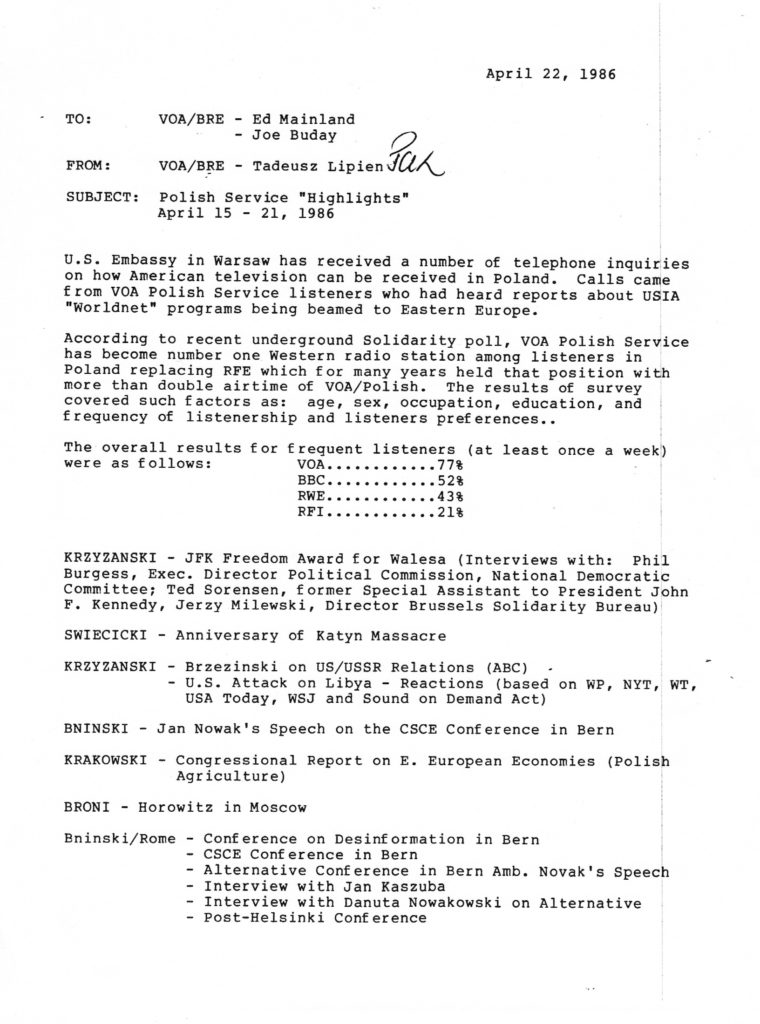
Memorandum from VOA/BRE Tadeusz Lipień summarizing Polish Service program highlights and audience data for April 15–21, 1986. 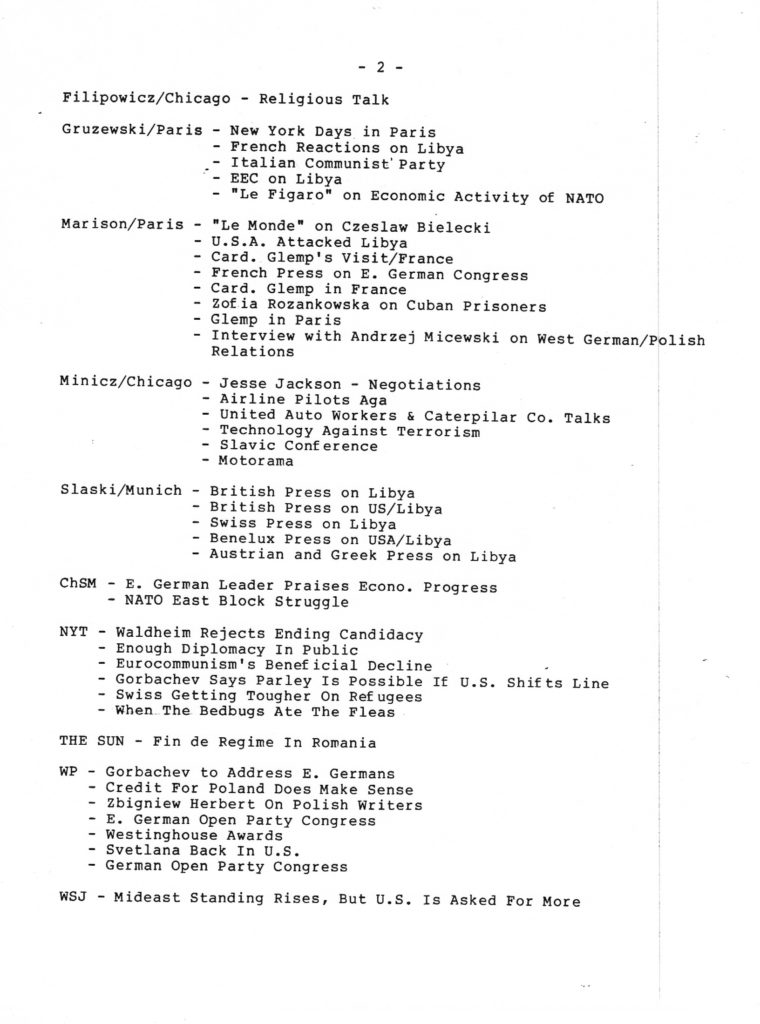
Continuation of the Polish Service “Highlights” memo, listing major reports from VOA Polish Service correspondents in Europe and the United States. 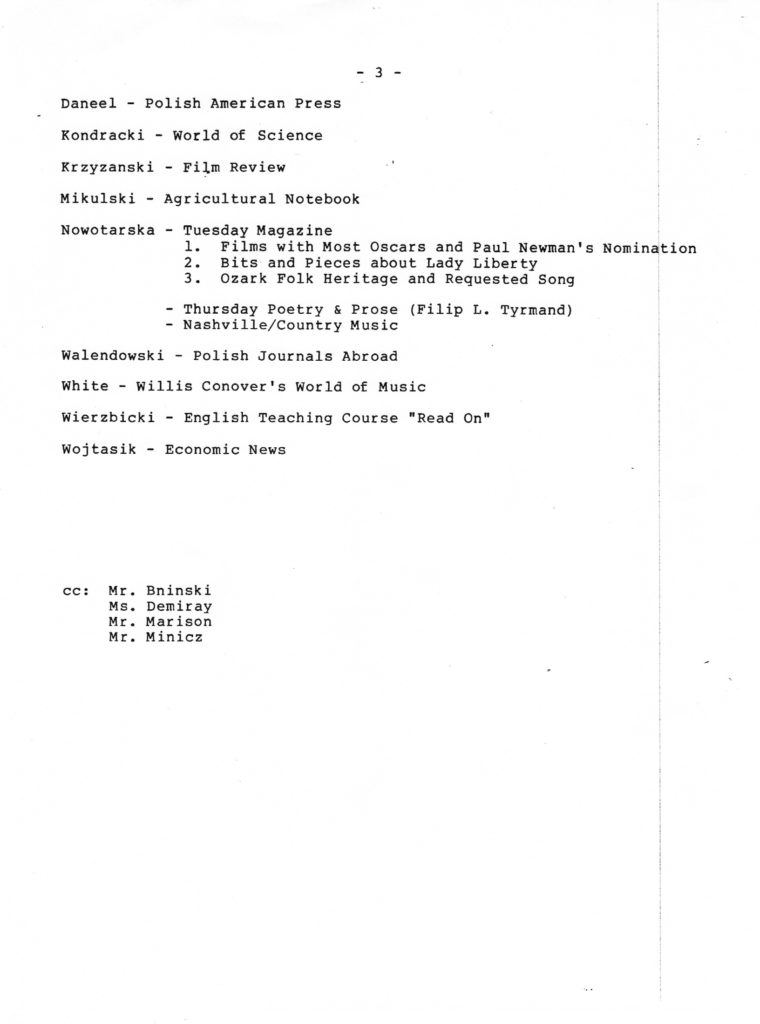
Final page of the April 22, 1986 memorandum, noting cultural, music, and science segments included in the Polish Service programming. - See the chart below.
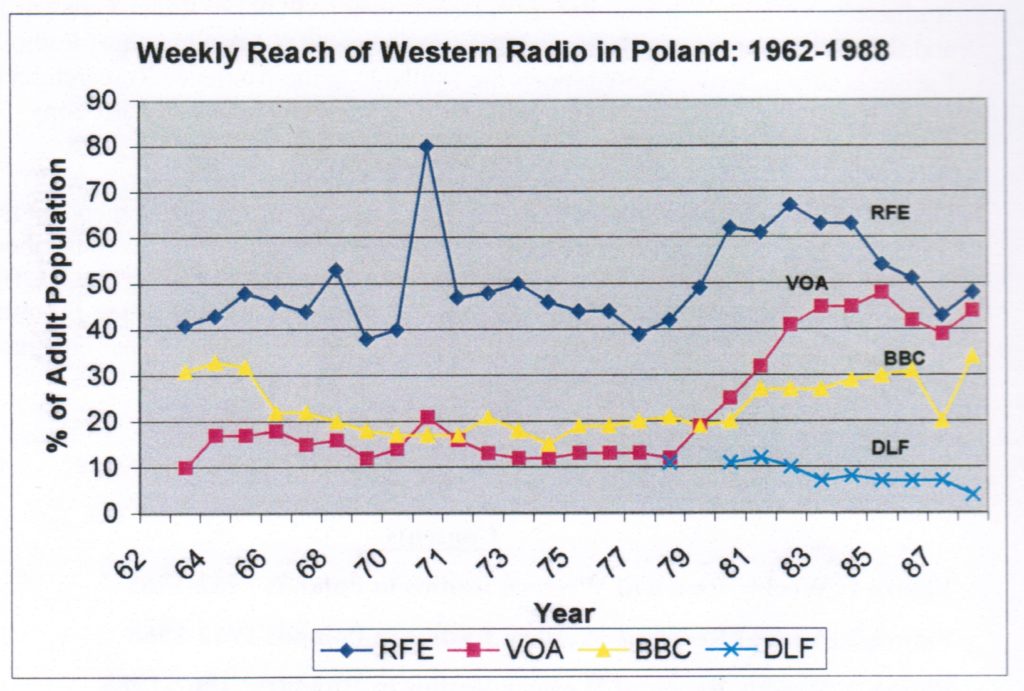
R. Eugene Parta, (Former) Director of Audience Research and Program Evaluation, Radio Free Europe/Radio Liberty, Inc., “Listening to Western Radio Stations in Poland, Hungary, Czechoslovakia, Romania, and Bulgaria: 1962-1988 — Longitudinal Listening Trend Charts.” Prepared for the Conference on Cold War broadcasting Impact co-organized by the Cold War International History Project, Woodrow Wilson International Center for Scholars, Washington, DC, and the Hoover Institution of Stanford University, Stanford, California, October 13-15, 2004. - Kate Wright, Martin Scott, and Mel Bunce, Capturing News, Capturing Democracy: Trump and the Voice of America (Oxford: Oxford University Press, 2024), 39.
- Mark G Pomar, (Lincoln: Potomac Books, 2022) Cold War Radio: The Russian Broadcasts of the Voice of America and Radio Free Europe Radio Liberty, 113.



